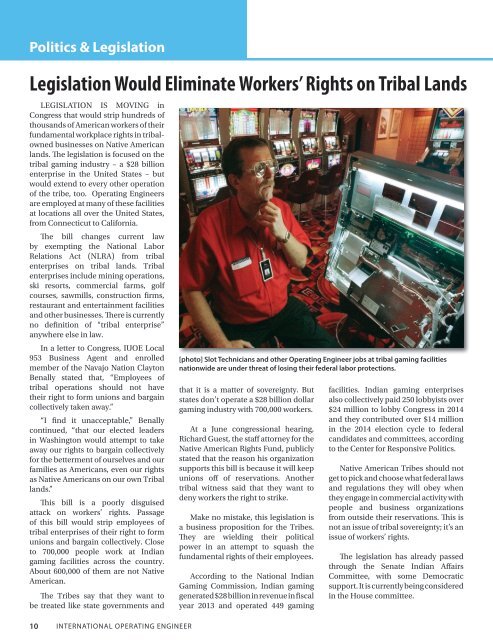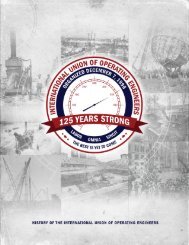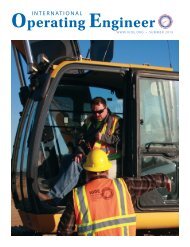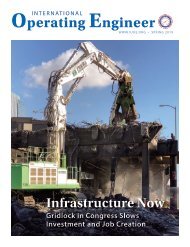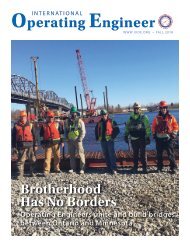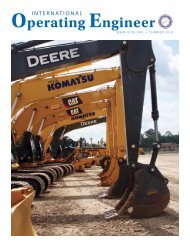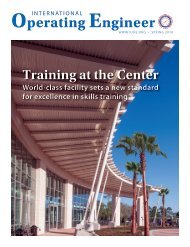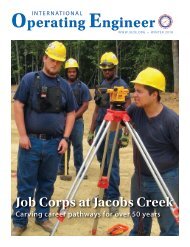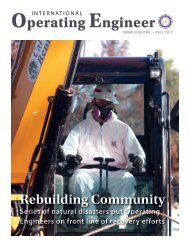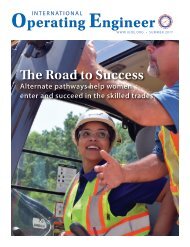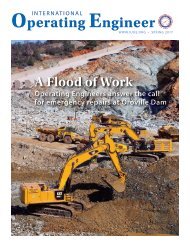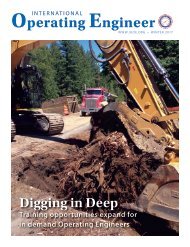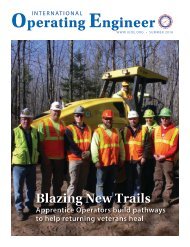International Operating Engineer - Summer 2015
The quarterly magazine of the International Union of Operating Engineers.
The quarterly magazine of the International Union of Operating Engineers.
- No tags were found...
Create successful ePaper yourself
Turn your PDF publications into a flip-book with our unique Google optimized e-Paper software.
Politics & Legislation<br />
Legislation Would Eliminate Workers’ Rights on Tribal Lands<br />
LEGISLATION IS MOVING in<br />
Congress that would strip hundreds of<br />
thousands of American workers of their<br />
fundamental workplace rights in tribalowned<br />
businesses on Native American<br />
lands. The legislation is focused on the<br />
tribal gaming industry – a $28 billion<br />
enterprise in the United States – but<br />
would extend to every other operation<br />
of the tribe, too. <strong>Operating</strong> <strong>Engineer</strong>s<br />
are employed at many of these facilities<br />
at locations all over the United States,<br />
from Connecticut to California.<br />
The bill changes current law<br />
by exempting the National Labor<br />
Relations Act (NLRA) from tribal<br />
enterprises on tribal lands. Tribal<br />
enterprises include mining operations,<br />
ski resorts, commercial farms, golf<br />
courses, sawmills, construction firms,<br />
restaurant and entertainment facilities<br />
and other businesses. There is currently<br />
no definition of “tribal enterprise”<br />
anywhere else in law.<br />
In a letter to Congress, IUOE Local<br />
953 Business Agent and enrolled<br />
member of the Navajo Nation Clayton<br />
Benally stated that, “Employees of<br />
tribal operations should not have<br />
their right to form unions and bargain<br />
collectively taken away.”<br />
“I find it unacceptable,” Benally<br />
continued, “that our elected leaders<br />
in Washington would attempt to take<br />
away our rights to bargain collectively<br />
for the betterment of ourselves and our<br />
families as Americans, even our rights<br />
as Native Americans on our own Tribal<br />
lands.”<br />
This bill is a poorly disguised<br />
attack on workers’ rights. Passage<br />
of this bill would strip employees of<br />
tribal enterprises of their right to form<br />
unions and bargain collectively. Close<br />
to 700,000 people work at Indian<br />
gaming facilities across the country.<br />
About 600,000 of them are not Native<br />
American.<br />
The Tribes say that they want to<br />
be treated like state governments and<br />
[photo] Slot Technicians and other <strong>Operating</strong> <strong>Engineer</strong> jobs at tribal gaming facilities<br />
nationwide are under threat of losing their federal labor protections.<br />
that it is a matter of sovereignty. But<br />
states don’t operate a $28 billion dollar<br />
gaming industry with 700,000 workers.<br />
At a June congressional hearing,<br />
Richard Guest, the staff attorney for the<br />
Native American Rights Fund, publicly<br />
stated that the reason his organization<br />
supports this bill is because it will keep<br />
unions off of reservations. Another<br />
tribal witness said that they want to<br />
deny workers the right to strike.<br />
Make no mistake, this legislation is<br />
a business proposition for the Tribes.<br />
They are wielding their political<br />
power in an attempt to squash the<br />
fundamental rights of their employees.<br />
According to the National Indian<br />
Gaming Commission, Indian gaming<br />
generated $28 billion in revenue in fiscal<br />
year 2013 and operated 449 gaming<br />
facilities. Indian gaming enterprises<br />
also collectively paid 250 lobbyists over<br />
$24 million to lobby Congress in 2014<br />
and they contributed over $14 million<br />
in the 2014 election cycle to federal<br />
candidates and committees, according<br />
to the Center for Responsive Politics.<br />
Native American Tribes should not<br />
get to pick and choose what federal laws<br />
and regulations they will obey when<br />
they engage in commercial activity with<br />
people and business organizations<br />
from outside their reservations. This is<br />
not an issue of tribal sovereignty; it’s an<br />
issue of workers’ rights.<br />
The legislation has already passed<br />
through the Senate Indian Affairs<br />
Committee, with some Democratic<br />
support. It is currently being considered<br />
in the House committee.<br />
Saving the Highway Fund and Jobs Comes Down to the Wire<br />
THE CURRENT HIGHWAY BILL was<br />
due to expire at the end of July. As<br />
this magazine went to press, separate<br />
and competing bills in the House<br />
and Senate were being considered to<br />
extend the program. The question is<br />
over how long to extend it.<br />
Over the past several years, Congress<br />
has been passing short-term extension<br />
after short-term extension. Their<br />
failure to pass a long-term bill has cost<br />
thousands of <strong>Operating</strong> <strong>Engineer</strong>s jobs.<br />
The IUOE supports a long-term, fully<br />
funded program. Congress must come<br />
up with about $15 billion every year for<br />
the program. Unfortunately, neither<br />
Democrats nor Republicans have had<br />
the will to fund this critical program.<br />
Without a fully funded, long-term<br />
highway bill, the United States will<br />
never be able to repair and rebuild our<br />
crumbling infrastructure.<br />
According to the 2013 report by the<br />
American Society of Civil <strong>Engineer</strong>s<br />
(ASCE):<br />
• 32% of America’s major roads are<br />
in poor or mediocre condition<br />
• 42% of America’s major urban<br />
highways are congested<br />
• 1 in 9 of the nation’s bridges are<br />
rated as structurally deficient<br />
• 45% of Americans lack access to<br />
public transit<br />
• The U.S is ranked 16th in the<br />
world in terms of our overall<br />
infrastructure quality<br />
The <strong>Operating</strong> <strong>Engineer</strong>s are not alone<br />
in advocating for a fully funded, longterm<br />
highway bill. Many organizations<br />
and industry groups that span the<br />
political spectrum have been pleading<br />
with Congress for years to work<br />
together and get this done.<br />
Stay up-to-date on how Congress<br />
decides to address this critical issue by<br />
visiting: www.iuoe.org<br />
EnginEErs Action rEsponsE nEtwork<br />
Because elections matter<br />
Make your voice heard • Register for EARN today<br />
www.iuoe.org<br />
10<br />
INTERNATIONAL OPERATING ENGINEER<br />
SUMMER <strong>2015</strong> 11


